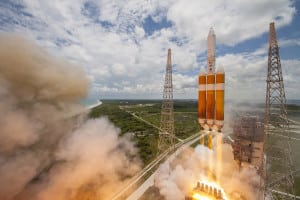The Air Force and the National Reconnaissance Office (NRO) have awarded a contract modification worth $1.175 billion to United Launch Alliance that includes five national security space launches.
The contract, which was awarded Sept. 27, provides for the launch operations support (LOPS) for the final five NRO missions aboard ULA’s Delta IV Heavy launch vehicle, including NROL-44, NROL-82, NROL-91, NROL-68 and NROL-70. ULA is a joint launch venture between Boeing [BA] and Lockheed Martin [LMT].

The launches for NROL-44 and NROL-82 are currently scheduled for fiscal year 2020, said Air Force Col. Robert Bongiovi, director of the Space and Missile Systems Center’s Launch Enterprise Systems Directorate in a Sept. 30 media call. NROL-91, NROL-68 and NROL-70 are forecast to launch in fiscal years 2022, 2023 and 2024, respectively.
The Air Force has previously awarded ULA launch vehicle production services (LVPS) contracts to procure the five Delta IV Heavy vehicles for these missions. The NROL-44 and NROL-82 rockets were procured via a fiscal year 2017 Evolved Expendable Launch Vehicle (EELV) Phase 1 Block Buy contract, but both missions slipped to 2020 and necessitated a new, separate launch operations support contract, Bongiovi said.
NROL-82’s launch vehicle production contract was awarded in April 2017, while NROL-44’s production contract was awarded in December 2016. NROL-91, NROL-68 and NROL-70’s rocket production programs were procured in an October 2018 sole-sourced contract.
LVPS contracts cover materials and manufacturing labor needed to produce the launch vehicles, whereas LOPS covers launch pad maintenance, and range support at Vandenberg AFB and Cape Canaveral Air Force Station, launch vehicle propellants, satellite encapsulation, and the system engineers and technicians that support production and launch operations, per SMC. “To meet required launch dates while maintaining the best value for the Government, SMC and NRO divided this contract into a Launch Vehicle Production Services (LVPS) component and a LOPS component,” the center said in a Sept. 30 statement. Over the past year, Bongiovi’s office has examined the LOPS cost in depth and negotiated a better deal, saving the service $455 million, he added.
These contracts encompass the “last remnants of sole-source contracts,” Bongiovi said, noting that at the time SMC was awarding contracts in 2016 and 2017, the Delta IV Heavy was the only vehicle deemed capable of fulfilling the highly classified NRO missions, which have “unique and complex launch requirements and are among the most important space assets in the nation.”
Work will be performed at Centennial, Colorado; Pueblo, Colorado; Decatur, Alabama; and Harlingen, Texas, with launch facilities at Cape Canaveral Air Force Station, Florida; and Vandenberg Air Force Base, California, and is expected to be completed by Feb. 29, 2024, per the award notice Monday. The total contract value is increased from $467.5 million to $1.64 billion to include five annual options. Fiscal 2019 procurement funds are were obligated at the time of award.
Bongiovi did not reveal whether the Air Force has plans for what to do with the current Delta IV Heavy launch pads, SLC-37B at Cape Canaveral Air Force Station, Florida, and SLC-6 at Vandenberg AFB, California, once the final launches are performed.
“Lainch pads are a precious resource. … I think we are going to let this play out a little bit. As we get closer to the end, we’ll figure out who’s interested in what, depending on the situation,” he said.
With the completion of the EELV Phase 1 Block Buy, the Air Force plans to compete future launch service contracts under its National Space Security Launch (NSSL) Phase 2 Launch Services Procurement (LSP) program. The service has issued a draft request for proposals for LSP, in which it anticipates selecting two providers for a 60/40 split of all future national security space missions between 2022 and 2026.
ULA, Space X, Blue Origin and Northrop Grumman Innovation Systems [NOC] – formerly Orbital ATK – have expressed an intent to participate, and Blue Origin filed a pre-award protest with the Government Accountability Office (GAO), alleging unfair criteria that favor legacy providers over new entrants (Defense Daily, Aug. 12).